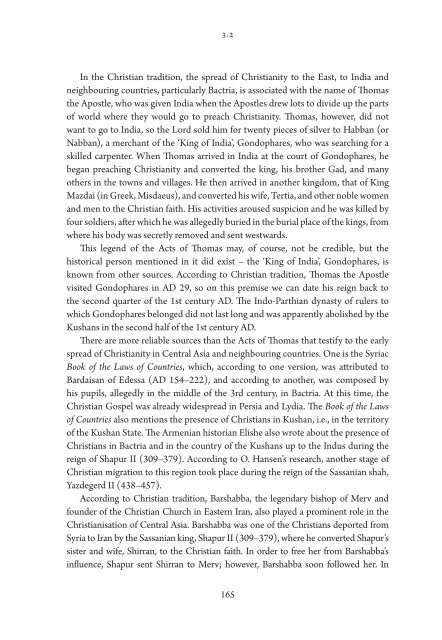You also want an ePaper? Increase the reach of your titles
YUMPU automatically turns print PDFs into web optimized ePapers that Google loves.
3.2<br />
In the Christian tradition, the spread <strong>of</strong> Christianity to the East, to India and<br />
neighbouring countries, particularly Bactria, is associated with the name <strong>of</strong> Thomas<br />
the Apostle, who was given India when the Apostles drew lots to divide up the parts<br />
<strong>of</strong> world where they would go to preach Christianity. Thomas, however, did not<br />
want to go to India, so the Lord sold him for twenty pieces <strong>of</strong> silver to Habban (or<br />
Nabban), a merchant <strong>of</strong> the ‘King <strong>of</strong> India’, Gondophares, who was searching for a<br />
skilled carpenter. When Thomas arrived in India at the court <strong>of</strong> Gondophares, he<br />
began preaching Christianity and converted the king, his brother Gad, and many<br />
others in the towns and villages. He then arrived in another kingdom, that <strong>of</strong> King<br />
Mazdai (in Greek, Misdaeus), and converted his wife, Tertia, and other noble women<br />
and men to the Christian faith. His activities aroused suspicion and he was killed by<br />
four soldiers, after which he was allegedly buried in the burial place <strong>of</strong> the kings, from<br />
where his body was secretly removed and sent westwards.<br />
This legend <strong>of</strong> the Acts <strong>of</strong> Thomas may, <strong>of</strong> course, not be credible, but the<br />
historical person mentioned in it did exist – the ‘King <strong>of</strong> India’, Gondophares, is<br />
known from other sources. According to Christian tradition, Thomas the Apostle<br />
visited Gondophares in AD 29, so on this premise we can date his reign back to<br />
the second quarter <strong>of</strong> the 1st century AD. The Indo-Parthian dynasty <strong>of</strong> rulers to<br />
which Gondophares belonged did not last long and was apparently abolished by the<br />
Kushans in the second half <strong>of</strong> the 1st century AD.<br />
There are more reliable sources than the Acts <strong>of</strong> Thomas that testify to the early<br />
spread <strong>of</strong> Christianity in Central <strong>Asia</strong> and neighbouring countries. One is the Syriac<br />
Book <strong>of</strong> the Laws <strong>of</strong> Countries, which, according to one version, was attributed to<br />
Bardaisan <strong>of</strong> Edessa (AD 154–222), and according to another, was composed by<br />
his pupils, allegedly in the middle <strong>of</strong> the 3rd century, in Bactria. At this time, the<br />
Christian Gospel was already widespread in Persia and Lydia. The Book <strong>of</strong> the Laws<br />
<strong>of</strong> Countries also mentions the presence <strong>of</strong> Christians in Kushan, i.e., in the territory<br />
<strong>of</strong> the Kushan State. The Armenian historian Elishe also wrote about the presence <strong>of</strong><br />
Christians in Bactria and in the country <strong>of</strong> the Kushans up to the Indus during the<br />
reign <strong>of</strong> Shapur II (309–379). According to O. Hansen’s research, another stage <strong>of</strong><br />
Christian migration to this region took place during the reign <strong>of</strong> the Sassanian shah,<br />
Yazdegerd II (438–457).<br />
According to Christian tradition, Barshabba, the legendary bishop <strong>of</strong> Merv and<br />
founder <strong>of</strong> the Christian Church in Eastern Iran, also played a prominent role in the<br />
Christianisation <strong>of</strong> Central <strong>Asia</strong>. Barshabba was one <strong>of</strong> the Christians deported from<br />
Syria to Iran by the Sassanian king, Shapur II (309–379), where he converted Shapur’s<br />
sister and wife, Shirran, to the Christian faith. In order to free her from Barshabba’s<br />
influence, Shapur sent Shirran to Merv; however, Barshabba soon followed her. In<br />
165


